BusinessEurope Headlines No. 2017-38
European business leaders in Downing Street
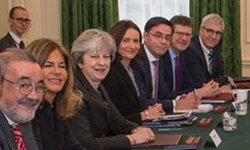 BusinessEurope President Emma Marcegaglia led a delegation of member federations, including the Confederation of British Industry (CBI), to meet the UK Prime Minister Theresa May on 13 November 2017. The delegation conveyed the sense of urgency of moving the Brexit negotiations forward. “We are increasingly concerned with the slow pace of negotiations. One year has already been lost and time pressure is rising”, said President Marcegaglia. During the meeting, the business community stated that a cliff edge would be the worst-case scenario. “We are united as business to stress the need for transitional arrangements to allow companies enough time to prepare while there is no clarity about the future relation between the UK and the EU”, President Marcegaglia stated, adding that a “status quo-like” solution ensuring the UK remains in the customs union and in the single market for the duration of the transition period, with all appropriate rights and obligations, would be best to provide citizens and business with more certainty and predictability. In order to be able to achieve this, Business clearly stressed the need for the UK Government to rapidly provide further detailed negotiating proposals for all the three issues that are critical in the first phase of the talks, and calls on the EU to constructively receive these proposals.
BusinessEurope President Emma Marcegaglia led a delegation of member federations, including the Confederation of British Industry (CBI), to meet the UK Prime Minister Theresa May on 13 November 2017. The delegation conveyed the sense of urgency of moving the Brexit negotiations forward. “We are increasingly concerned with the slow pace of negotiations. One year has already been lost and time pressure is rising”, said President Marcegaglia. During the meeting, the business community stated that a cliff edge would be the worst-case scenario. “We are united as business to stress the need for transitional arrangements to allow companies enough time to prepare while there is no clarity about the future relation between the UK and the EU”, President Marcegaglia stated, adding that a “status quo-like” solution ensuring the UK remains in the customs union and in the single market for the duration of the transition period, with all appropriate rights and obligations, would be best to provide citizens and business with more certainty and predictability. In order to be able to achieve this, Business clearly stressed the need for the UK Government to rapidly provide further detailed negotiating proposals for all the three issues that are critical in the first phase of the talks, and calls on the EU to constructively receive these proposals.
Contact: Luisa Santos
Europe’s industrial strategy discussed with Council High-Level Group on Competitiveness and Growth
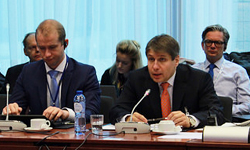 “We need a framework that allows industry to adapt, create a level playing field, and ensure Europe remains in a top position, leading by example and ensuring that the benefits of progress are spread out to the society as a whole”, said BusinessEurope Director General Markus J. Beyrer, during a meeting on the long-term vision for Europe’s industrial strategy with members of the Council High-Level Group on Competitiveness and Growth on the 9 November 2017. He added that "we must define ambitious strategic objectives for the industry for the year 2030, be able to properly monitor progress towards these objectives with a good set of indicators, and improve its governance”. Beyrer concluded that it was also crucial to analyse the current industrial base and seize the opportunities in the macro trends.
“We need a framework that allows industry to adapt, create a level playing field, and ensure Europe remains in a top position, leading by example and ensuring that the benefits of progress are spread out to the society as a whole”, said BusinessEurope Director General Markus J. Beyrer, during a meeting on the long-term vision for Europe’s industrial strategy with members of the Council High-Level Group on Competitiveness and Growth on the 9 November 2017. He added that "we must define ambitious strategic objectives for the industry for the year 2030, be able to properly monitor progress towards these objectives with a good set of indicators, and improve its governance”. Beyrer concluded that it was also crucial to analyse the current industrial base and seize the opportunities in the macro trends.
Contact: Joana Valente
Europe must take further action to support its industry
 “Due to the fast-technological progress, companies can be out of business in a blink of an eye, unless they adapt and anticipate future trends”, said BusinessEurope Director General Markus J. Beyrer at a breakfast discussion on industrial competitiveness and the energy transition on 9 November 2017. The event was hosted by the Mission of Norway to the EU and had the presence of Eldar Sætre, President and Chief Executive of Statoil. BusinessEurope welcomes the communication issued by the European Commission in September, which recognises an EU industrial strategy as a fundamental piece of the future of Europe debate. However, this is only a first step. “We now need a structured way forward in order to ensure we steer positive change without hurting our industry”, Beyrer stressed. In terms of energy transition, the major challenge will be to strike the balance between decarbonisation, competitiveness and social needs.
“Due to the fast-technological progress, companies can be out of business in a blink of an eye, unless they adapt and anticipate future trends”, said BusinessEurope Director General Markus J. Beyrer at a breakfast discussion on industrial competitiveness and the energy transition on 9 November 2017. The event was hosted by the Mission of Norway to the EU and had the presence of Eldar Sætre, President and Chief Executive of Statoil. BusinessEurope welcomes the communication issued by the European Commission in September, which recognises an EU industrial strategy as a fundamental piece of the future of Europe debate. However, this is only a first step. “We now need a structured way forward in order to ensure we steer positive change without hurting our industry”, Beyrer stressed. In terms of energy transition, the major challenge will be to strike the balance between decarbonisation, competitiveness and social needs.
Contact: Joana Valente
Reaping the benefits of the Eastern Partnership
 BusinessEurope was invited to join the Alliance of Liberals and Democrats for Europe (ALDE) high level roundtable on Eastern Partnership, which took place on 8-9 November 2017 in Brussels. “Empowering the private sector and the broader civil society in Eastern Partnership countries is fundamental to safeguard the rule of law and ensure accountability in the public sector”, stated Luisa Santos, BusinessEurope's International Relations Director. Launched within the framework of the EU’s Neighbourhood Policy, the Eastern Partnership enables the six partner countries – Armenia, Azerbaijan, Belarus, Georgia, Moldova and Ukraine – to move closer to the EU through increased political, economic and cultural links. An important tool of the Eastern Partnership is Association Agreements, so far signed between the EU and Ukraine, Georgia and Moldova. Those agreements include Deep and Comprehensive Free Trade Areas (DCFTAs) and strong components on civil society engagement. European businesses can share valuable experiences with their counterparts and help them develop their own models of civil society dialogue. Santos concluded that it is crucial to ensure that EU partners are aware of the opportunities available through the Eastern Partnership and are prepared to reap the benefits of a closer cooperation, which can occur, for instance, by completing necessary economic and political reforms.
BusinessEurope was invited to join the Alliance of Liberals and Democrats for Europe (ALDE) high level roundtable on Eastern Partnership, which took place on 8-9 November 2017 in Brussels. “Empowering the private sector and the broader civil society in Eastern Partnership countries is fundamental to safeguard the rule of law and ensure accountability in the public sector”, stated Luisa Santos, BusinessEurope's International Relations Director. Launched within the framework of the EU’s Neighbourhood Policy, the Eastern Partnership enables the six partner countries – Armenia, Azerbaijan, Belarus, Georgia, Moldova and Ukraine – to move closer to the EU through increased political, economic and cultural links. An important tool of the Eastern Partnership is Association Agreements, so far signed between the EU and Ukraine, Georgia and Moldova. Those agreements include Deep and Comprehensive Free Trade Areas (DCFTAs) and strong components on civil society engagement. European businesses can share valuable experiences with their counterparts and help them develop their own models of civil society dialogue. Santos concluded that it is crucial to ensure that EU partners are aware of the opportunities available through the Eastern Partnership and are prepared to reap the benefits of a closer cooperation, which can occur, for instance, by completing necessary economic and political reforms.
Contact: Sofia Bournou
Tax Group discusses Corporate Taxation with European Commission
 BusinessEurope's Tax Policy Working Group welcomed Valère Moutarlier, Director at the European Commission’s Directorate General for Taxation and Customs Unions, and his colleagues Reinhard Biebel and Uwe Ihli to its meeting on 8 November 2017. Moutarlier set out the Commission’s recent work in areas such as the fight against tax evasion, the Common Consolidated Corporate Tax Base (CCCTB) and digital taxation, before taking questions from members. As part of the discussion on digital taxation, a number of members noted that any initiatives in this domain should be based on global taxation principles to ensure European companies’ competitiveness and to guarantee a global level playing field.
BusinessEurope's Tax Policy Working Group welcomed Valère Moutarlier, Director at the European Commission’s Directorate General for Taxation and Customs Unions, and his colleagues Reinhard Biebel and Uwe Ihli to its meeting on 8 November 2017. Moutarlier set out the Commission’s recent work in areas such as the fight against tax evasion, the Common Consolidated Corporate Tax Base (CCCTB) and digital taxation, before taking questions from members. As part of the discussion on digital taxation, a number of members noted that any initiatives in this domain should be based on global taxation principles to ensure European companies’ competitiveness and to guarantee a global level playing field.
Contact: Pieter Baert
Not less, but more collaboration on research and innovation
 “In the spirit of addressing the EU’s innovation deficit, ways of strengthening collaboration between academia, research providers, public authorities and industry should be further explored in the preparation of the successor of EU's research and innovation programme Horizon 2020”, said Alexandre Affre, BusinessEurope Director of Industrial Affairs, at an event organised by the Norwegian University of Science and Technology on 8 November 2017. The next flagship programme for research and innovation needs to do even better in fostering cross-border collaborative projects to turn Europe’s excellent research into marketable solutions that generate value for our economy and society. A polarised debate on ‘research’ versus ‘innovation’ should be avoided, Affre added.
“In the spirit of addressing the EU’s innovation deficit, ways of strengthening collaboration between academia, research providers, public authorities and industry should be further explored in the preparation of the successor of EU's research and innovation programme Horizon 2020”, said Alexandre Affre, BusinessEurope Director of Industrial Affairs, at an event organised by the Norwegian University of Science and Technology on 8 November 2017. The next flagship programme for research and innovation needs to do even better in fostering cross-border collaborative projects to turn Europe’s excellent research into marketable solutions that generate value for our economy and society. A polarised debate on ‘research’ versus ‘innovation’ should be avoided, Affre added.
Contact: Alexandre Affre
Improving social dialogue contribution to economic and social progress
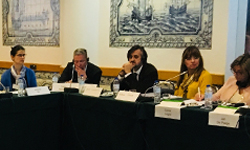 In a time of changing economies and societies, a supporting environment for productive and competitive companies is essential to create employment opportunities and improve working conditions. Social dialogue solutions at the appropriate levels can play an important role. These were the key messages passed by BusinessEurope Social Affairs Director Maxime Cerutti during the first cluster seminar on “Reinforcing the EU social dialogue and industrial relations”, organised by the European social partners in Lisbon on 8 and 9 November 2017. Social partners representatives came from Portugal, Belgium, Bulgaria and Spain. “This seminar has demonstrated the need to improve the functioning and effectiveness of social dialogue in some countries. An important challenge ahead is to strengthen the capacity of social partners organisations”, Cerutti said, adding that, where needed, the adaptation of collective bargaining frameworks was also important to ensure appropriate space for mutually beneficial collective bargaining solutions for employers and workers.
In a time of changing economies and societies, a supporting environment for productive and competitive companies is essential to create employment opportunities and improve working conditions. Social dialogue solutions at the appropriate levels can play an important role. These were the key messages passed by BusinessEurope Social Affairs Director Maxime Cerutti during the first cluster seminar on “Reinforcing the EU social dialogue and industrial relations”, organised by the European social partners in Lisbon on 8 and 9 November 2017. Social partners representatives came from Portugal, Belgium, Bulgaria and Spain. “This seminar has demonstrated the need to improve the functioning and effectiveness of social dialogue in some countries. An important challenge ahead is to strengthen the capacity of social partners organisations”, Cerutti said, adding that, where needed, the adaptation of collective bargaining frameworks was also important to ensure appropriate space for mutually beneficial collective bargaining solutions for employers and workers.
Contact: Maxime Cerutti
Modern regulation for high quality professional services
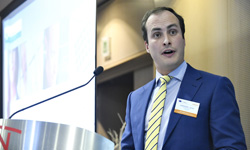 There are good reasons to regulate certain professions such as doctors, architects and accountants to ensure high quality service, safety and to regulate for the public interest. At the same time, professions need to be regulated in such a way that it does not pose unnecessary barriers to access those profession in another Member State or that it disproportionally restricts the free movement of services in the single market. These messages were stressed by Jeroen Hardenbol, BusinessEurope Senior Adviser for Services during the Single Market Forum organised by the European Commission on 9 November 2017. BusinessEurope supports the setting-up and the application of a proportionality test before the adoption or reform of national regulation for professions, as this procedure would help identify and remove unnecessary regulatory obstacles to free movement. The European Commission guidance to Member States is also welcome to steer them in finding the best ways to regulate professions and to avoid burdensome regulation that de facto fragments labour markets. There are about 5000 different regulated professions in Europe. While that may be justified, 25% of them are only regulated in one Member State. It brings up the question on whether we can reduce the number of professions that require additional skills, experience or extra diplomas.
There are good reasons to regulate certain professions such as doctors, architects and accountants to ensure high quality service, safety and to regulate for the public interest. At the same time, professions need to be regulated in such a way that it does not pose unnecessary barriers to access those profession in another Member State or that it disproportionally restricts the free movement of services in the single market. These messages were stressed by Jeroen Hardenbol, BusinessEurope Senior Adviser for Services during the Single Market Forum organised by the European Commission on 9 November 2017. BusinessEurope supports the setting-up and the application of a proportionality test before the adoption or reform of national regulation for professions, as this procedure would help identify and remove unnecessary regulatory obstacles to free movement. The European Commission guidance to Member States is also welcome to steer them in finding the best ways to regulate professions and to avoid burdensome regulation that de facto fragments labour markets. There are about 5000 different regulated professions in Europe. While that may be justified, 25% of them are only regulated in one Member State. It brings up the question on whether we can reduce the number of professions that require additional skills, experience or extra diplomas.
![]() Contact: Jeroen Hardenbol
Contact: Jeroen Hardenbol
How to modernise the EU definition of SMEs?
 The current EU definition for Small and Medium-sized Enterprises (SMEs) is difficult to understand and can work against the EU objectives of facilitating access to venture capital and reducing administrative burdens for SMEs. This was the main message revealed by an assessment performed by BusinessEurope in advance of the public consultation that the European Commission will launch in December 2017. On 7 November, BusinessEurope Director General Markus J. Beyrer wrote a letter to the European Commission Vice-Presidents Jyrki Katainen and Valdis Dombrovskis and to the European Commissioner for Internal Market, Industry, Entrepreneurship and SMEs Elżbieta Bieńkowska, explaining problems experienced by SMEs and proposing solutions. The letter summarises a more detailed BusinessEurope position on the EU SME definition revision planned by the Commission.
The current EU definition for Small and Medium-sized Enterprises (SMEs) is difficult to understand and can work against the EU objectives of facilitating access to venture capital and reducing administrative burdens for SMEs. This was the main message revealed by an assessment performed by BusinessEurope in advance of the public consultation that the European Commission will launch in December 2017. On 7 November, BusinessEurope Director General Markus J. Beyrer wrote a letter to the European Commission Vice-Presidents Jyrki Katainen and Valdis Dombrovskis and to the European Commissioner for Internal Market, Industry, Entrepreneurship and SMEs Elżbieta Bieńkowska, explaining problems experienced by SMEs and proposing solutions. The letter summarises a more detailed BusinessEurope position on the EU SME definition revision planned by the Commission.
![]() Contact: Daniel Cloquet
Contact: Daniel Cloquet
European Parliament needs to strengthen power markets & ensure coherence of proposals
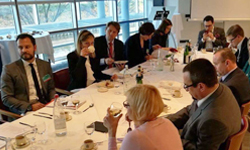 The European Parliament Clean Energy for All Europeans' package brings a unique opportunity to facilitate the transformation of the power system and create a level playing field for all energy sources, including demand response. At a European Parliament event organised by the Socialists & Democrats (S&D) Group members Pavel Poc and Martina Werner on the energy package on 14 November 2017, BusinessEurope's Senior Adviser Jan Bambas stressed the need to strengthen the competitiveness aspect horizontally across the package – be it in the Energy Union governance, energy efficiency or in the market design. The intervention revolved around the proposals on how to incentivise investments, remove distortions and regulatory obstacles and to adapt the markets to energy transition. Bambas highlighted the preference for market-based solutions to decarbonise the European economy and made clear that BusinessEurope is in favour of an energy-only market to deliver a functioning energy system with right signals and secure supplies of clean electricity. With strong commitment of the industry to further increase its energy efficiency, he also asked for more flexibility and choice of cost-effective measures, without undermining other objectives and instruments.
The European Parliament Clean Energy for All Europeans' package brings a unique opportunity to facilitate the transformation of the power system and create a level playing field for all energy sources, including demand response. At a European Parliament event organised by the Socialists & Democrats (S&D) Group members Pavel Poc and Martina Werner on the energy package on 14 November 2017, BusinessEurope's Senior Adviser Jan Bambas stressed the need to strengthen the competitiveness aspect horizontally across the package – be it in the Energy Union governance, energy efficiency or in the market design. The intervention revolved around the proposals on how to incentivise investments, remove distortions and regulatory obstacles and to adapt the markets to energy transition. Bambas highlighted the preference for market-based solutions to decarbonise the European economy and made clear that BusinessEurope is in favour of an energy-only market to deliver a functioning energy system with right signals and secure supplies of clean electricity. With strong commitment of the industry to further increase its energy efficiency, he also asked for more flexibility and choice of cost-effective measures, without undermining other objectives and instruments.
Contact: Jan Bambas
Intellectual property rights shouldn’t be matter of foreign judgments
 As negotiations on a proposed Convention on the Recognition and Enforcement of Foreign Judgments have been taking place in The Hague this week, BusinessEurope has called for patents, trademarks and designs not to be covered by it. Intellectual property rights are a matter of national law and different courts must apply divergent national laws. A possible inclusion could potentially result in greater uncertainty, unwelcome forum shopping, and increased litigation. BusinessEurope called for a broader discussion at EU and national level on this issue.
As negotiations on a proposed Convention on the Recognition and Enforcement of Foreign Judgments have been taking place in The Hague this week, BusinessEurope has called for patents, trademarks and designs not to be covered by it. Intellectual property rights are a matter of national law and different courts must apply divergent national laws. A possible inclusion could potentially result in greater uncertainty, unwelcome forum shopping, and increased litigation. BusinessEurope called for a broader discussion at EU and national level on this issue.
![]() Contact: Ilias Konteas
Contact: Ilias Konteas
Calendar 
- 17 November: Social Summit in Gothenburg
- 20 November: Council vote on the European Medicines Agency (EMA) and the European Banking Authority (EBA) relocation
- 20 November: Digital content proposal
- 21 November: Advisory and Support Group CEO event
- 22 November: European Semester package & Annual Growth Survey 2018
- 23 November: Trade defence instruments (TDI) modernisation Trilogue
- 23 November: Me, myself and AI: What future for artificial intelligence in Europe?
- 25 November: UK Prime Minister Theresa May meets European Parliament leaders
- 29-30 November: EU Africa Summit
- 30 November - 1 December: Competitiveness Council
- 2 December: Eurogroup
- 6 December: Economic and Monetary Union (EMU) reform package